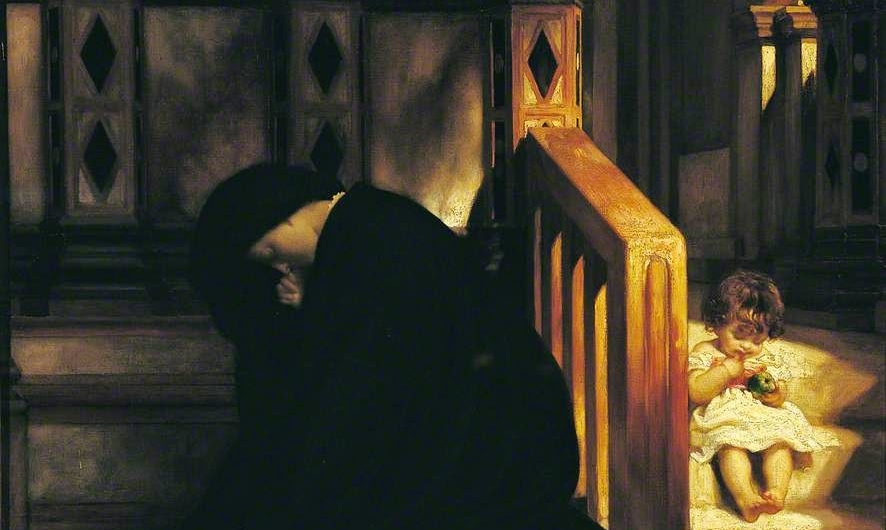“For heaven’s sake, is it time to pray again?” I remember asking this question with great exasperation in my first weeks as a novice. It seemed that we were stopping every other hour or so for prayer. My idealism from the months before I entered—“Finally, I’ll be able to enjoy more time for prayer!”—was beginning to flag in the face of exhaustion at the new routine. You have searched me, O Lord, and found me sleepy.
I felt this most keenly during the time that Dominican friars alternately call mental prayer. For at least thirty minutes a day, a friar is called to “contemplate divine truth, and [seek] personal conversation and friendship with God” in private prayer (LCO 66.2). The great Dominican scholar Fr. Reginald Garrigou-Lagrange contrasted mental prayer from study—another task in which Dominicans are exhorted to be “assiduous.” He writes,
Speculation or study does not proceed necessarily from charity and does not terminate necessarily in the love of God: we can give ourselves to the study of theology without having charity. On the other hand, mental prayer or contemplation proceeds essentially from charity and terminates in an act of love of God. It is through love that we seek to contemplate God, and the contemplation of the beauty and goodness of God increases our love…Mental prayer has for its purpose the stirring up of the fire of charity. (Knowing the Love of God, p. 156)
Friendship with God? Contemplation of Divine Truth? Stirring up the fire of charity? Well, sign me up! How could thirty minutes possibly suffice? And yet, what is one to do when the well runs dry? When moments of hylemorphic reality set in—that is, when it becomes all too evident that we are composed of bodies and souls—Dominicans intuitively reach for a book.
Casual choir stall snooping reveals wide variation here. Naturally (and rightly), the Scriptures themselves are most commonly found, as the Word of God is always fruitful for contemplation and prayer. Some brothers seem to prefer working through lengthy treatises bit by bit, while others incline towards collections of sermons. The Fathers predominate in some choir stalls, while more contemporary authors hold sway in other rows.
I tend to prefer books of prayers and meditations—things to jump start my own contemplation. I have long loved The Aquinas Prayer Book, which is filled with artful renderings of the prayers and hymns of the Angelic Doctor that lyrically express his theological vision. Magnificat magazine is indispensable, combining Mass readings and prayers with beautiful meditations, artwork, and essays that never fail to offer grist for the contemplative mill.
But when it comes to prayer books, I find myself always searching. I am not looking for a manual of familiar or classic prayers, nor a catch-all book that seeks to cover all the bases with something for everybody. My great white whale in a prayer book is a collection that exists for giving that contemplative spark to my mental prayer, drawing from sources ancient and new to help me in conversation with God when I draw a blank.
Into this breach wades Fr. Peter John Cameron, O.P., the editor of Magnificat and a Dominican friar. With the publication of his new collection, Prayers for the Moment, Fr. Cameron offers a small, handsome leather volume that seems to exactly fit the bill for what I was seeking. In his preface to the book, he explains how and why this book came to be:
This book was born of human weakness. Every so often when I am trying to pray, but there still is allotted time to go, I find myself getting weary. It becomes hard to concentrate. But I don’t want to give up, I don’t want to stop—I want to keep going! It’s in those moments that I wish I had the help of a beautiful little book of prayers that would give me a boost, refocusing my attention and reviving my fervor. The prayers I have selected for this volume were chosen because of their distinctive ability to do just that. These are the prayers that I personally rely on to fend off distraction, refresh energy and encouragement, deepen recollection, and to communicate to God important things I feel inside when I can’t come up with adequate words myself. (About this Book, Prayers for the Moment, p. 13)
In Prayers for the Moment, the reader finds a fascinating variety of authors, from familiar saints like Gregory the Great and Therese of Lisieux, to literary figures like Dante and Flannery O’Connor, to those less well-known such as Adele Dirsyte and Léonce de Grandmaison. From evocative Byzantine akathists to Pope Benedict’s moving prayer for “Easter joy in the midst of the Holy Saturday of history,” the works in this volume offer a wide range of genres and historical styles. The prayers, by and large, are unfamiliar—and therein is the collection’s greatest strength. These are not just the prayers with which most Catholics are readily accustomed; rather, these prayers invite new consideration, and offer the possibility of putting fresh words on tired tongues.
The moment to which the title of the book refers can be any moment in time of mental prayer. There are prayers in this volume that fit the whole range of emotions and circumstances in which we find ourselves as we seek to contemplate divine truth. Fr. Peter John Cameron has done a great service to anyone seeking new sources of inspiration for their prayer. Prayers for the Moment is a worthy companion for assiduous pray-ers in need of a momentary boost.
Peter John Cameron, O.P., ed., Prayers for the Moment. New York: Magnificat (2015): 208pp.
✠
Image: Frederic Leighton, The Widow’s Prayer







